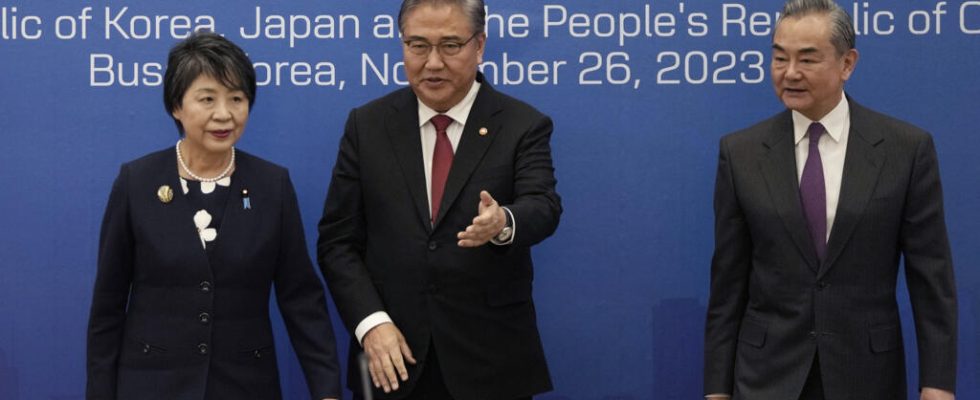The foreign ministers of China, Japan and South Korea met this Sunday, November 26 in Busan, Korea. A trilateral summit which has not been held for a long time and which aims to re-establish cooperation between these states which have not always gotten along well. The decryption by Antoine Bondaz, researcher at the Foundation for Strategic Research (FSR).
3 mins
After the meeting – a first since 2019 – between the head of South Korean diplomacy Park Jin, and his Chinese and Japanese counterparts, Yoko Kamikawa and Wang Yi, in Busan, researcher Antoine Bondaz comments on the stated objective of this meeting.
“ We have a revival, he said, of the trilateral discussion process, a process which was initiated in the mid-to-late 2000s and which concluded in particular, at the beginning of the 2010s, with the creation of a secretariat for trilateral cooperation. »
This secretariat, in recent years, “ wasn’t of much use “, he specifies. But in his eyes, this meeting reflects a desire for rapprochement between “ three Northeast Asian countries, which are three economic heavyweights among the top 10 in the world economy “.
They decide to resume language even though “ areas of dissension have multiplied in recent years, not so much between Japan and South Korea, which have become considerably closer since the election and coming to power of President Yoon Suk-yeol in Seoul, but indeed the disputes between China and Japan on the one hand, and between China and South Korea on the other. »
Everyone has a card to play
These ” irritants » between China and its neighbors relate in particular to territorial questions, recalls Antoine Bondaz. “ Between China and Japan, about the Senkaku and Diaoyu islands, and to a lesser extent, the Ieodo islands and rocks between China and Korea. »
And to also mention the economy, the desire of Seoul and Tokyo to “ further protect their internal market, with China which is increasingly competing with them, particularly in sectors where they were almost hegemonic, whether it be the shipyard, whether it is the automobile industry, whether it is obviously electronics “.
Worse, there are the strategic issues, “ the deterioration of the situation in the Taiwan Strait, in the South China Sea ”, which worries two countries “ for whom maintaining freedom of navigation and the ability to trade, particularly as far as Europe, is extremely important “.
In the eyes of the researcher, everyone has a card to play. On the one hand, “ Japan and South Korea can coordinate, which they did not do before, to exert more influence against China “, and on the other, in Beijing, ” there is the desire to avoid in particular that trilateral cooperation between Washington, Tokyo and Seoul, for once, strengthens too much, and therefore to try to slow down this rapprochement “.
Read alsoBusan: China, South Korea and Japan dismantle regional issues ahead of tripartite summit
